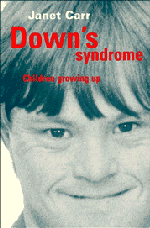Book contents
- Frontmatter
- Contents
- Acknowledgements
- 1 Down's syndrome – implications of the diagnosis
- 2 Populations and procedures
- 3 The developmental study
- 4 Self-care and independence
- 5 Behaviour and discipline
- 6 Focusing on the individual
- 7 Effect on the families
- 8 Help from services
- 9 Summary and conclusions
- References
- Index
9 - Summary and conclusions
Published online by Cambridge University Press: 06 July 2010
- Frontmatter
- Contents
- Acknowledgements
- 1 Down's syndrome – implications of the diagnosis
- 2 Populations and procedures
- 3 The developmental study
- 4 Self-care and independence
- 5 Behaviour and discipline
- 6 Focusing on the individual
- 7 Effect on the families
- 8 Help from services
- 9 Summary and conclusions
- References
- Index
Summary
The developmental study
Like other groups of children with Down's syndrome, those in Surrey had relatively high scores on developmental tests in the first few months, the scores decreasing rapidly in early infancy and, in this group, more slowly after the age of 10 months. The decline continued to 11 years, so the rise at the age of 21 was the more unexpected. A substantial rise in IQ, in a similarly aged group of adults, has been shown elsewhere (Berry et al. 1984), although it is not clear how far this may have been due to the remedial programme in which the group was involved. Nevertheless, the downward curve of scores, seen in numerous studies in early childhood, may not inevitably continue. It has long been accepted that people with Down's syndrome continue to be able to learn and to develop skills well after the school-leaving age; it may be that, in the course of the learning that occurs in childhood and adolescence, they also acquire techniques, strategies and insights that can be applied to performance on psychological tests. In non-disabled populations, such an increase in skill at older ages occurs more commonly in relation to verbal than to non-verbal material. Given their relative difficulties with verbal material this might not be expected to hold good for people with Down's syndrome and indeed the opposite trend was seen in both the studies discussed: in the Surrey study the gain was seen on a non-verbal test (the Leiter scale) following one with some verbal content (the Merril–Palmer scale), and in the study by Berry et al. (1984) the gain on a non-verbal test (Raven's Matrices) was substantially greater than that on a verbal test (Peabody Picture Vocabulary Test).
- Type
- Chapter
- Information
- Down's SyndromeChildren Growing Up, pp. 166 - 180Publisher: Cambridge University PressPrint publication year: 1995



